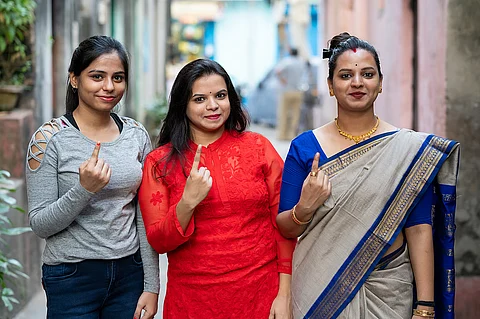

Voting for the Delhi Assembly elections is set to take place on February 5, 2025, with the counting of votes scheduled for February 8. According to the final voter list, around 15.5 million voters are eligible to cast their ballots across 70 assembly constituencies.
Among them, women — about 7.17 million in numbers — are expected to play a decisive role in determining the outcome. This demographic prominence has prompted all three major political parties to promise direct cash transfers to women as a central plank of their campaigns.
The Aam Aadmi Party (AAP), Indian National Congress and Bharatiya Janata Party (BJP) have all announced monthly cash transfer schemes aimed at women.
The Aam Aadmi Party (AAP) has pledged a monthly transfer of Rs 2,100 to all women, while the Congress and the Bharatiya Janata Party (BJP) have both announced Rs 2,500 per month. This emphasis on financial assistance for women is part of a broader trend seen in other states, where such schemes have been deployed successfully to sway voters.
The BJP has implemented similar programmes during previous elections. In Madhya Pradesh, for instance, the party introduced the Ladli Behna Yojana ahead of the assembly elections, transferring Rs 1,000 per month to 12.5 million women.
After the BJP’s victory, this amount was raised to Rs 1,250, with the December 2024 instalment disbursing Rs 1,553 crore to 12.7 million beneficiaries. The party had promised to increase this to Rs 3,000, but a timeline for this increment remains unclear.
In Maharashtra, a similar strategy was employed ahead of the assembly elections, with Rs 1,500 per month distributed to 23.4 million women. Although the BJP pledged to increase this amount to Rs 2,100 post-election, women are still receiving only Rs 1,500, amid allegations that the government is reducing the number of beneficiaries. Ministers have indicated that a budgetary increase is forthcoming.
In Haryana, under the Lado Laxmi Yojana, the BJP promised Rs 2,100 per month to all women. However, even after the BJP’s electoral success in October 2024, no instalments have been disbursed to date and the specifics of the scheme remain uncertain.
BJP’s cash transfer schemes for women, often tied to income criteria and limited to those aged between 21 and 60, have become a hallmark of their electoral strategy. Eligibility conditions frequently include an annual family income cap of Rs 2.5 lakh and women receiving similar benefits under other schemes are typically excluded.
In Delhi, however, the ruling AAP has taken a different approach, promising Rs 2,100 to every woman, without the income restrictions outlined by the BJP. The Congress, on the other hand, has committed Rs 2,500 to women from poor families. The BJP has yet to clarify whether its proposed cash transfer will be universal or restricted to economically disadvantaged women.
Critics of the AAP have pointed to the party’s unfulfilled promise during the 2022 Punjab elections, where it had pledged Rs 1,000 per month to women but has yet to implement the scheme.
The trend of cash transfers targeting women is not limited to Delhi, other states have introduced similar initiatives as well. Karnataka provides Rs 2,000 per month to approximately 12.5 million women with Antyodaya, Below Poverty Line and Above Poverty Line cards.
West Bengal offers Rs 1,200 to women from Scheduled Caste and Tribe categories and Rs 1,000 to those from other economically weaker sections. In Jharkhand, the Chief Minister Maiya Samman Yojana recently increased monthly assistance from Rs 1,000 to Rs 2,500 for 5.5 million women. Odisha’s Subhadra Yojana offers Rs 10,000 annually to women from families earning less than Rs 2.5 lakh per year.
Economists remain divided over the long-term impact of these cash transfer schemes. Some warn of the financial strain they place on state economies, while others highlight their potential to enhance women’s financial autonomy and decision-making power within households.
Advocates argue that such programmes enable women to allocate resources according to their priorities, fostering empowerment.
During the Covid-19 pandemic, direct cash transfers into women’s Jan Dhan accounts were widely lauded as a critical intervention, demonstrating the efficacy of such initiatives in addressing immediate economic needs.
With women emerging as a key electoral force in Delhi, the promises of cash transfers are likely to be a decisive factor in shaping the outcome of the upcoming elections. Whether these pledges translate into sustained empowerment or remain election-time rhetoric will be closely watched.